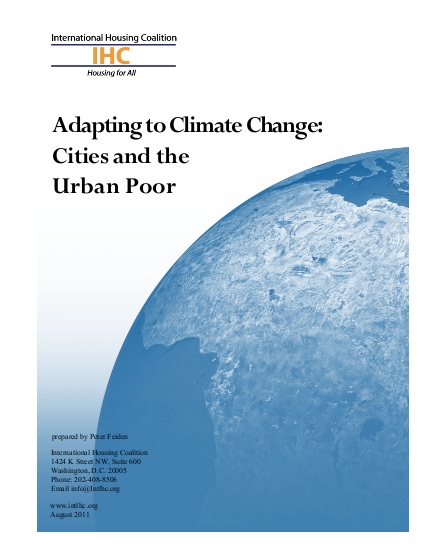
Global climate change will have enormous impacts on urban areas in the developing world. The known and growing effects of climate change – increased temperatures, rising seas, and increased incidence of severe storms – will be especially significant for cities due to the location of many along the coast, the population and capital assets at risk, and the important role of port cities in national economies. Within cities of the developing world, the poor are typically the most vulnerable. They tend to live in slum/informal settlements, often located in areas most exposed to the effects of global climate change, notably low-lying areas, steep slopes, and ravines. Little or no infrastructure exists to provide protection from storm events or to ensure mobility. Reflecting the low and unstable incomes of the residents, but exacerbated by poor land tenure characteristics, little or no building regulation, and lack of housing finance, housing quality is low and provides poor resistance to natural disasters. The inherent vulnerability of these settlements is amplified as the effects of global climate change become more pronounced. This paper explores some of the emerging issues that cities in the developing world confront as they begin to develop plans and strategies to adapt to the effects of global climate change. The emphasis is on low-income populations, both those now settled in cities and those still to migrate from rural areas. In some instances, this migration is due to reduced agricultural productivity, itself a product of global climate change. The urban poor are vulnerable because of where they live and the condition of their shelter. Yet their low incomes, poor access to information, and lack of market alternatives limit their ability to move to safer environments. Sustaining and improving human settlements in the face of ongoing global climate change should become an important lens for cities as they look to the future. Areas where the poor live will pose special challenges. Adapting to climate change will require many cities to substantially improve their capacity in precisely those areas where past deficiencies have resulted in the proliferation of informal settlements. These include land using planning and regulation, effective infrastructure investment, and legal and administrative systems that can support the development of efficient land markets and tenure arrangements. Governments will need to wrestle with complicated issues as they try to adapt to climate change impacts at the local level – equity in public expenditures; collaboration with private investors; the authority, role and capacity of local governments; and incorporating much long-range projections into plans and investments, to name a few.
Resource collections
- Climate emergency
- Topics
- UN Habitat - Urban Response Collection
- Urban Response - Urban Crisis Preparedness and Risk Reduction
- Urban Response Collection - Community Engagement and Social Cohesion
- Urban Response Collection - Economic Recovery
- Urban Response Collection - Environment and Climate Change
- Urban Response Collection - Housing, Land and Property
- Urban Response Collection - Urban Crisis Response, Recovery and Reconstruction
- Urban Response Collection - Urban Resilience
